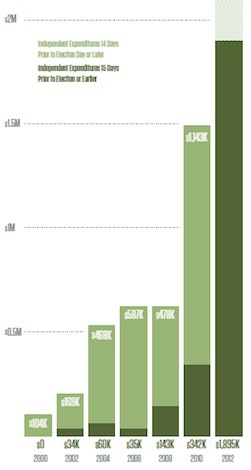
About the Series
The Money in Politics Project is a series of twelve reports about the role and effect of money on Maine politics. The reports combine a review of publicly available campaign finance data with on-the-ground analysis of how money influences Maine's elections, government, and public policy. Maine Citizens for Clean Elections launched this project because money in politics is an issue of vital concern to the people of Maine, one that goes to the heart of our democratic system.Read other reports
Private Money Making a Comeback in Maine Elections
Download the full report: Letter-sized Tabloid-sized
With just ten days to go before Election Day 2012, Maine Citizens for Clean Elections offers a snapshot of private money in Maine's legislative elections. Using publicly available campaign finance reports filed with the state's Ethics Commission, MCCE analyzed the private money going directly to candidates and to independent expenditures.
For the last six election cycles, growing numbers of legislative candidates opted to use the voluntary Clean Election program rather than rely on private campaign donations. The 125th Legislature made changes to the popular law which make it less attractive to some candidates. This weakened system set up the potential for private money to play a bigger role, and our preliminary analysis reveals:
- A marked decline in the rate of participation in the Clean Election system. From a high of 80%, participation has dropped to 65%.
- A surge of private money going directly to legislative candidates. At this point in the cycle, private money has increased 300% over a similar period in the 2010 cycle.
- An emphasis on large donations. Over seventy percent of the money in privately funded campaigns came in donations of more than $100.
- An explosion of independent expenditures. With the most intensive period of independent spending yet to come, the amount spent has already exceeded the totals spent in prior election cycles.
These findings point to significant backsliding in Maine's ongoing effort to reduce the influence of special interest money in elections. We can't predict the outcome of the November 6th election, but it is evident that some participating Clean Election candidates, all of whom have a strict spending limit with no opportunity for additional funding, find themselves easy targets for well-funded independent expenditure campaigns. In prior years, the Clean Election system would have provided additional funding to allow these candidates to stay competitive and ensure that voters hear from the candidate over the din of outside spending.
Similarly, time will tell how the candidates who opted out of Clean Elections fare in the world of increased private money. Some privately funded candidates have already raised significantly more than the amounts available to Clean Election candidates and may be better prepared to respond to an onslaught of attack ads. But those who did not raise significant funds early in the campaign may find that they need to sacrifice valuable voter contact in order to solicit more private donations.
Underfunded candidates may well be rescued by friendly independent expenditures. But the interest groups making these expenditures can funnel unlimited contributions from any source into these campaigns, and these groups and the donors behind them may come to wield disproportional influence on government after the election is over.
All of this gives Maine voters plenty to think about in the final weeks of the 2012 election.
MCCE is releasing this report in order to illuminate the role of money in Maine politics. More comprehensive analysis will be completed when the final campaign finance reports are filed after Election Day. Understanding the effects of legislative changes to the citizen-initiated Clean Election Act will inform future efforts to improve the system and reduce special interest influence in our elections and in our government.
Read more in the full report: Letter-sized Tabloid-sized

